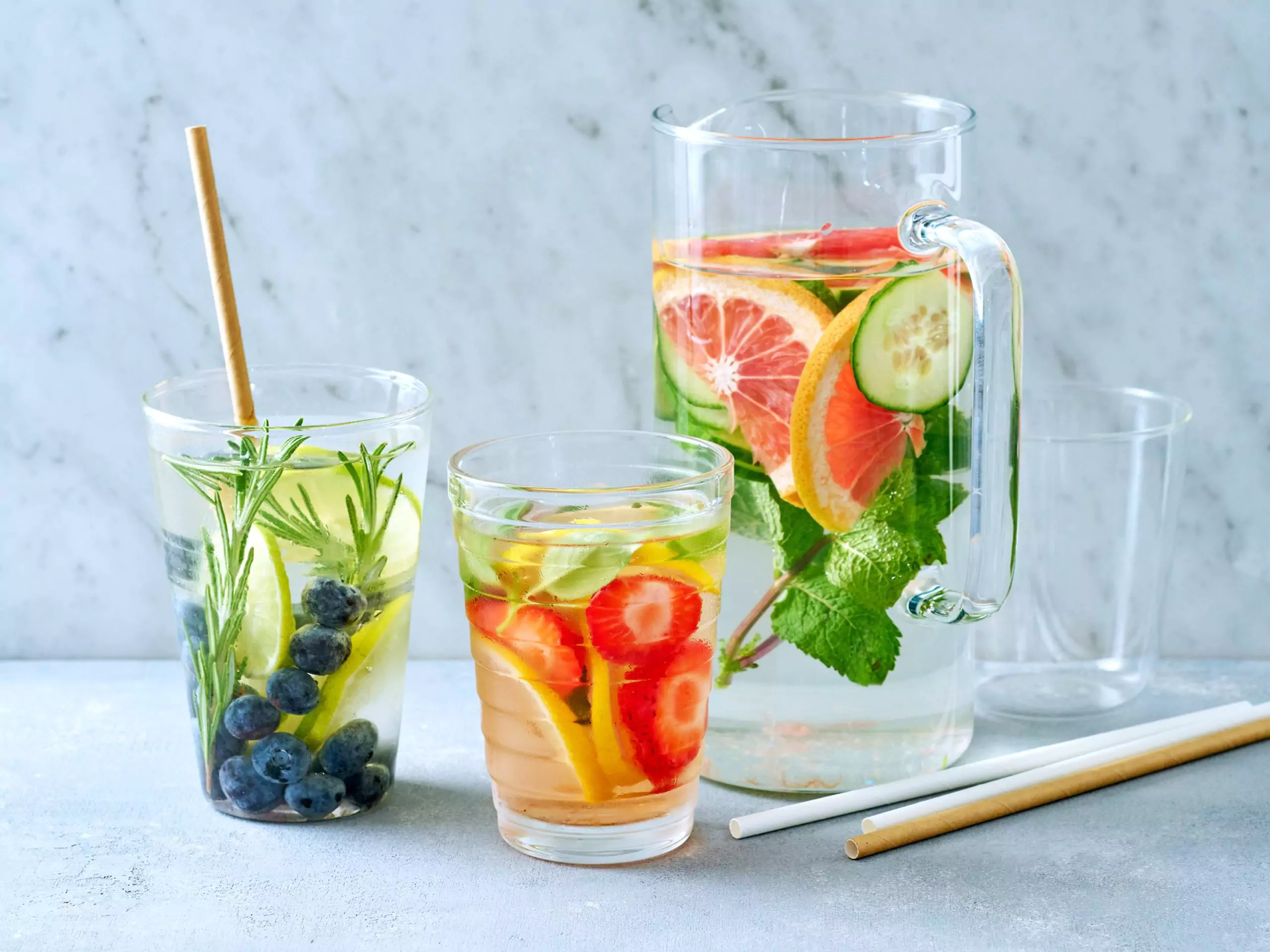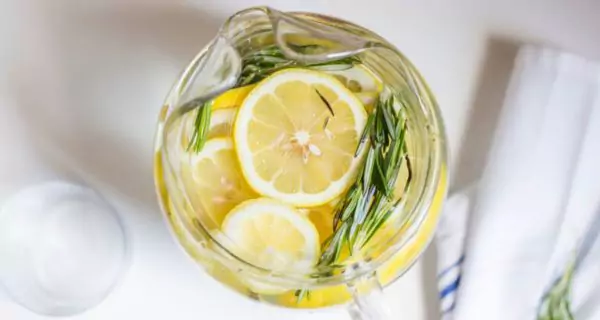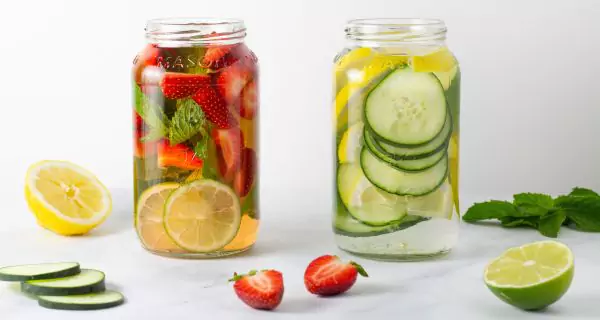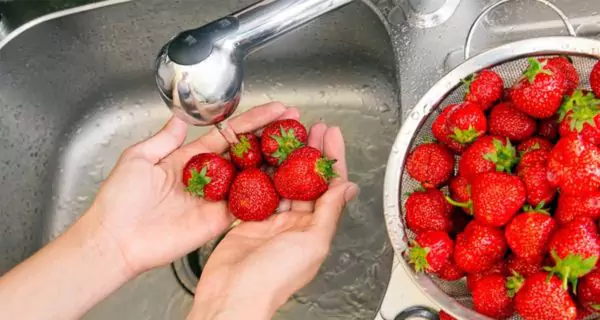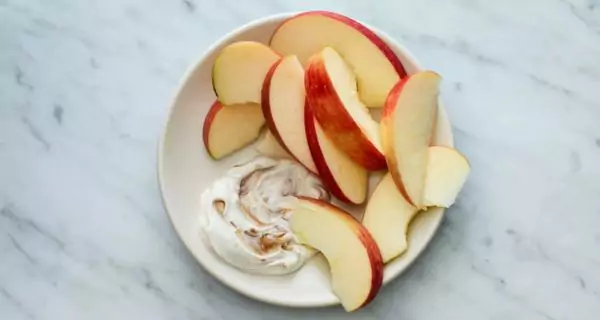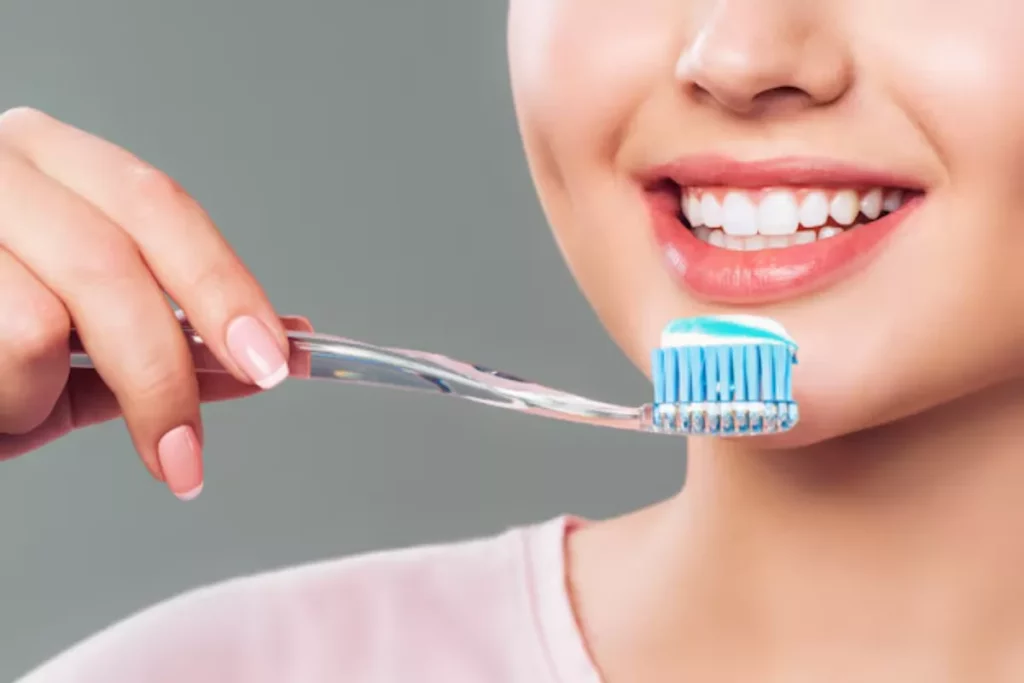Last Updated on: 15th December 2025, 06:36 am
Infused water recipes are a simple way to combine hydration and oral care. By mixing fruits, herbs, or vegetables with filtered water, you can enjoy refreshing flavors that also support a healthy mouth. Ingredients like cucumber and mint stimulate saliva, freshen breath, and reduce the need for sugary drinks. Just be mindful of acidic fruits like citrus to protect the enamel.
During hot summer months, fluid loss increases, which is why staying well hydrated is essential for your overall wellness. While plain water is the best option, many people prefer something with a bit more flavor. That’s where infused water recipes come in.
Unlike many flavored drinks on the market, often loaded with sugar or high acidity that can erode enamel and cause cavities, infused water offers a healthier alternative. Made with fresh, natural ingredients, it not only keeps you hydrated but also supports a cleaner, healthier mouth.
In this guide, we’ll explore how infused water recipes benefit your oral health, which ingredients are best to use, and how to enjoy them safely every day.
What is infused water?
Infused water is simply water that has been flavored with slices of fruits, vegetables, or herbs. Unlike commercial beverages, infused water recipes don’t contain sugar, preservatives, or carbonation. This makes them an excellent alternative to sodas, sports drinks, or fruit juices, which are often acidic and damaging to teeth.
How does infused water improve oral hygiene?
Infused water recipes offer a flavorful way to stay hydrated while protecting your oral health. Here’s how they help:
- Stimulate saliva production: saliva is essential for cleaning the mouth. It:
- washes away food particles
- neutralizes harmful acids
- helps remineralize tooth enamel
- Prevent dry mouth: dehydration reduces saliva flow, increasing the risk of:
- bad breath
- cavities
- gum disease
- Encourage water intake: Because infused water is flavorful, it motivates you to drink more, supporting continuous hydration and saliva flow.
- Reduce exposure to harmful ingredients: Unlike sodas or fruit juices, infused water:
- contains no added sugars
- has lower acidity
- is less likely to contribute to enamel erosion
- Lower bacterial buildup and plaque formation: By avoiding sugary, acidic drinks, you’re helping to maintain a healthier oral environment with fewer harmful bacteria.
In short, infused water supports your mouth’s natural defenses, keeping it moist, clean, and protected throughout the day.
What ingredients in infused water recipes are best for your teeth?
Certain ingredients in infused water recipes can actively support oral hygiene.
Ingredient | Oral health benefit | Recommended use |
Cucumber | Hydrating, soothing gums, mild antibacterial action | 4 – 8 slices per liter |
Mint or spearmint | Antimicrobial and breath-freshening, digestive support | 6 – 8 crushed leaves |
Strawberries / berries | Antioxidants and vitamin C; sweet flavor without sugar | 4 – 5 strawberries or a handful berries |
Apple + cinnamon | Stimulates saliva, mildly antibacterial | Apple slices + cinnamon stick |
Citrus fruits | Rich in vitamin C for gum health; acidic, so use in moderation | 2 – 3 slices per liter, consume quickly |
Note: Citrus fruits (lemon, lime, orange) are excellent sources of vitamin C, which is great for gums, but their acid can soften enamel. To reduce risks, use a straw, avoid sipping all day, and rinse your mouth with plain water afterward.
How can you safely prepare and store infused water recipes?
To get the most from your infused water recipes, preparation and storage are key:
- Wash fruits, vegetables, and herbs thoroughly to remove pesticides and bacteria.
- Use filtered or bottled water to ensure quality.
- Combine ingredients in a clean glass jar or bottle.
- Let it infuse in the fridge for 2 to 4 hours.
- Consume within 24 hours for best freshness and safety.
Avoid leaving infused water at room temperature for extended periods, especially in hot climates, as this may encourage bacterial growth.
What are the best infused water recipes for oral health?
Here are some tasty infused water recipes that not only hydrate but also promote a healthier smile:
- Cucumber and mint water: a classic refreshing combo. Cucumber soothes the mouth and mint combats bacteria and odors.
- Strawberry and basil water: sweet and rich in antioxidants. Basil adds anti-inflammatory benefits, perfect for sensitive gums.
- Apple and cinnamon water: great after meals for promoting saliva and neutralizing acids.
- Citrus trio (lemon, orange, lime): packed with vitamin C. Enjoy occasionally and consume quickly to minimize enamel exposure.
These infused water recipes are perfect alternatives to sugary drinks and ideal for summer.
How often should you drink infused water recipes?
You can drink infused water daily; it supports hydration, reduces sugar intake, freshens breath, and protects enamel, especially if you vary ingredients and limit acidic additions.
If you’re planning on drinking infused water with citrus, avoid sipping it continuously throughout the day. Constant exposure to acid can weaken enamel. Stick to drink them during meals or in one go and use a straw.
What snacks and products go well with infused water recipes for a healthy mouth?
Infused water recipes reach their full potential alongside tooth-friendly snacks and oral care tools. Here’s a structured guide.
What snacks support oral health alongside infused water recipes?
Combining infused water recipes with tooth-friendly foods can boost oral health. Here are some great snack options:
- Apples, carrots, and celery: crunchy foods that naturally clean your teeth while chewing.
- Cheese and plain yogurt: high in calcium and phosphate to strengthen enamel.
- Unsweetened nuts: great for stimulating saliva and reducing dry mouth.
These foods complement infused water by supporting saliva production and reducing harmful acids in the mouth.
What oral care products should you use with infused water recipes?
Even with healthy hydration, maintaining oral hygiene is essential. Here are key products to include in your daily routine:
- Fluoride toothpaste (e.g., Colgate, Crest): strengthens enamel and helps prevent decay.
- Antibacterial mouthwash (e.g., Listerine, ACT): reduces plaque-causing bacteria and freshens breath.
- Hydrating oral sprays (e.g., Biotene): combat dry mouth, especially with citrus use.
What daily care tips complement infused water recipes?
To get the most out of infused water recipes while protecting your teeth, follow these expert-recommended habits:
- Brush your teeth twice a day using fluoride toothpaste to strengthen enamel and prevent cavities.
- Use an antibacterial mouthwash once daily to reduce harmful bacteria and freshen breath.
- Rinse your mouth with plain water after drinking infused water, especially if it contains citrus or other acidic ingredients.
- Wait at least 30 minutes before brushing after consuming citrus-infused water to avoid brushing softened enamel.
- Use a straw when drinking acidic blends to minimize direct contact with your teeth.
Additional expert tips to support hydration and oral health
- Hydration boosts more than your mouth: Drinking more water, especially flavored with natural ingredients, can improve energy and focus and helps reduce dependence on sugary sodas.
- Reduce acidity with smart combinations: Mixing citrus or juice-based water with herbs (like mint or basil) or veggies (like cucumber) can help lower the overall acidity of the drink.
- Avoid immediate brushing after acidic drinks: Dental professionals recommend rinsing first with water and delaying brushing to protect softened enamel from erosion.
By combining infused water recipes with a smart oral care routine, you can enjoy all the benefits of hydration, without compromising your smile.
Conclusion
Infused water recipes are a delicious, natural, and tooth-friendly way to stay hydrated while promoting a healthy smile. By choosing the right ingredients and combining them with a solid oral care routine, you can keep your mouth fresh, moist, and well protected.
Whether it’s summer or any time of the year, making infused water part of your daily routine is an easy step toward better hydration and healthier teeth and gums. Sometimes, small changes make the biggest difference.
Frequently Asked Questions
Can infused water stain my teeth?
Is infused water safe for children?
Can I drink infused water if I have sensitive teeth?
Can I use frozen fruits in infused water?
What’s the difference between infused water and flavored water?
Voice and Search (Q&A)
How often should I drink infused water for my teeth?
You can drink it daily! Just avoid sipping citrus-infused water all day—stick to mealtimes, use a straw, and rinse with plain water afterward.
What are the best ingredients for tooth-friendly infused water?
Cucumber, mint, basil, and berries (in moderation) are great. They’re hydrating, soothing, and low in acid—perfect for enamel protection.
Can infused water help with bad breath?
Yes! Ingredients like mint, cucumber, and basil have antimicrobial properties and boost saliva flow, which helps fight bacteria and freshen your breath.
Share
References
1. Cleveland Clinic. (2024, May 1). Why you might want to give flavored water a chance. Cleveland Clinic. https://health.clevelandclinic.org/is-flavored-water-good-for-you
2. Landwehr, J. (2023, April 17). Watertok: Flavored water recipes are all over TikTok—But are they healthy? Health. https://www.health.com/watertok-flavored-water-recipes-tiktok-healthy-7480375
3. MouthHealthy. (n.d). Dietary acids and your teeth. (n.d.). MouthHealthy – Oral Health Information From the ADA. https://www.mouthhealthy.org/all-topics-a-z/dietary-acids-and-your-teeth
4. Stegeman, C. (2015, July 9). Infused water: diet aid or oral health hazard? Dimensions of Dental Hygiene. https://dimensionsofdentalhygiene.com/article/ask-the-expert-729/
5. WebMD Editorial Contributor. (2024, December 13). Are there health benefits to drinking infused water? WebMD. https://www.webmd.com/diet/health-benefits-infused-water
-
Dr. Yeidy Carolina Mesa [Author]
DDS Yeidy Carolina Mesa Passionate Dentist | Advocate for Accessible Oral Health Education Graduating from Universidad CES in 2022, I am a dedicated general dentist with a lifelong passion for helping others and making a meaningful impact in the world. My journey into dentistry began at the age of 7, inspired by my own experience with braces and overcoming a fear of the dentist. This personal journey shaped my mission to help patients conquer their own dental anxieties and embrace a healthier,...
View all posts
-
Nayibe Cubillos M. [Medical Reviewer]
Pharmaceutical Chemestry |Pharmaceutical Process Management | Pharmaceutical Care | Pharmaceutical Services Audit | Pharmaceutical Services Process Consulting | Content Project Manager | SEO Knowledge | Content Writer | Leadership | Scrum Master
View all posts
A healthcare writer with a solid background in pharmaceutical chemistry and a thorough understanding of Colombian regulatory processes and comprehensive sector management, she has significant experience coordinating and leading multidisciplina...


